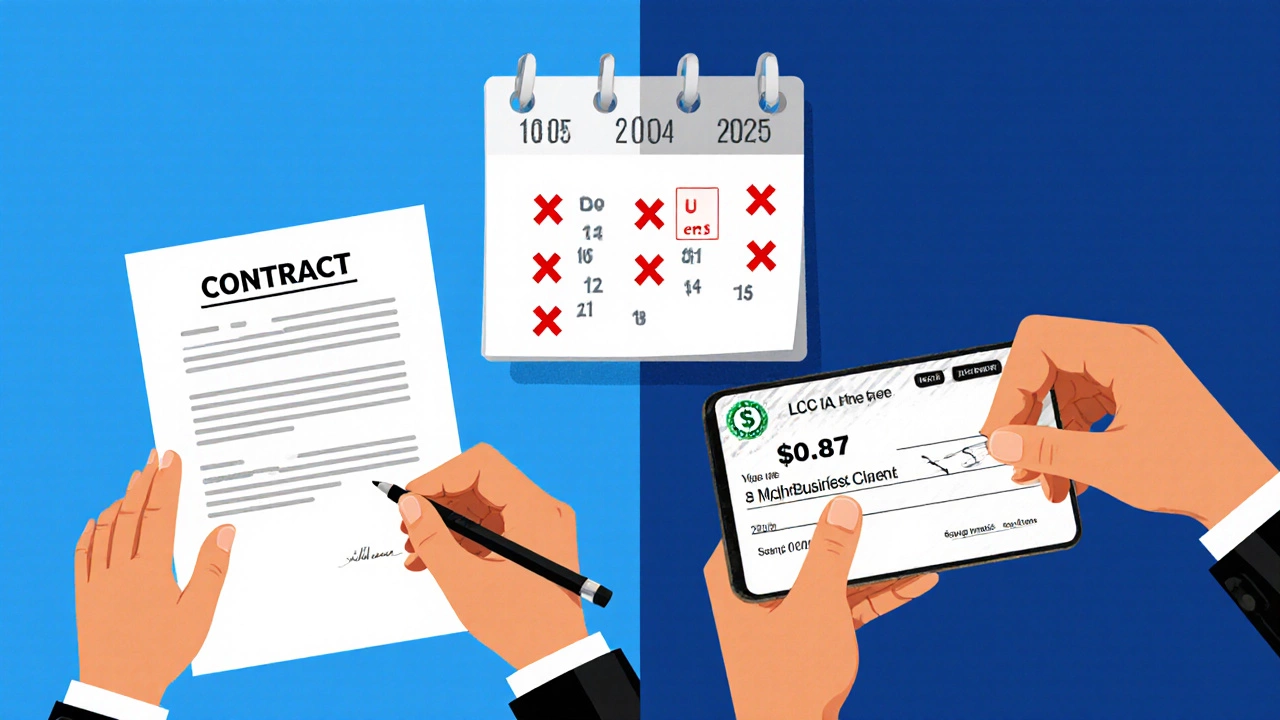LLC Cash Runway Calculator
How Long Can Your LLC Survive?
Calculate your business runway based on your available funds and monthly expenses. Remember: The IRS uses a 3-out-of-5-years rule for hobby classification.
Your Estimated Runway
Critical IRS Considerations
The IRS uses a 3-out-of-5-years rule. If your business shows net losses in 3 out of 5 consecutive tax years, they may reclassify it as a hobby. This means you can't deduct business expenses against other income.
Prove your business intent by:
- • Keeping accurate records
- • Documenting marketing efforts
- • Showing business planning
- • Maintaining a separate business account
Important: State fees continue even during losses. In California, it's $800/year. Missing payments could lead to dissolution and loss of liability protection.
Running a business that doesn’t make money right away isn’t unusual-it’s normal. But if you’ve just launched your LLC and haven’t seen a single dollar in profit, you’re probably wondering: How long can an LLC go without making money? The answer isn’t a fixed number. It depends on your bank balance, your tax obligations, your state’s rules, and how seriously you’re treating this as a real business.
There’s no legal deadline-but the IRS is watching
The government won’t shut down your LLC just because you’re losing money. In the U.S., there’s no law that says you must turn a profit within 3 months, 6 months, or even a year. But the Internal Revenue Service (IRS) does care. If your LLC shows losses for too long, they might decide you’re not running a real business-you’re just hobbying.The IRS uses a 3-out-of-5-years rule. If your business has net losses in 3 out of 5 consecutive tax years, they can reclassify it as a hobby. That means you can’t deduct business expenses against other income. You’re stuck writing off losses only against the business’s own income. That’s a big deal. If you’re using your LLC to offset your W-2 salary, this could cost you thousands in taxes.
So, if you’re losing money year after year, you need to prove you’re serious. Keep detailed records. Show marketing efforts. Track customer acquisition. Document your business plan. The IRS doesn’t expect you to be profitable immediately, but they do expect you to be trying.
How long can you actually last financially?
Legal rules are one thing. Real life is another. Your LLC can only survive as long as your cash lasts. Let’s say you started with $10,000 in savings. Your monthly expenses-rent, software, accounting, marketing-are $1,200. That’s about 8 months of runway. After that, you’re either bringing in revenue or you’re out of business.Most small business owners run out of money before they run out of time. A 2024 survey by the Small Business Administration found that 68% of startups that failed did so because they ran out of cash-not because the idea was bad. Your LLC isn’t a charity. It’s a financial engine. If it’s not producing fuel, it stops moving.
That’s why smart LLC owners plan for the first 12-18 months as a burn phase. They set aside enough money to cover living expenses and business costs without relying on income. They treat the first year like a paid internship-where you’re investing time and money to build something that will pay off later.
State fees and compliance don’t pause when you’re losing money
Even if your LLC isn’t making money, you still have to pay. Every state has annual fees. In California, it’s $800 per year just to keep your LLC active. In New York, it’s $250. In Australia, where I’m based, you still need to pay ASIC fees and lodge an annual statement-even if you made $0 in revenue.These fees don’t disappear because you’re broke. If you skip them, your LLC gets suspended or dissolved. Then you lose your legal protection. Creditors can come after your personal assets. Your business name gets released. You’ll have to re-register, pay penalties, and start over.
Don’t assume you can hide from compliance. The government doesn’t care if you’re struggling. They care if you’re registered. Keep paying your fees. File your reports. Even if you’re not earning, you’re still a business entity-and that comes with responsibilities.

What counts as a real business vs. a hobby?
The IRS doesn’t define “business” by profit. They define it by intent. Here’s what they look for:- Do you keep accurate books and records?
- Do you spend time on the business regularly, not just when you feel like it?
- Have you changed your approach after losses to try and improve?
- Do you have a written business plan?
- Do you have clients, contracts, or invoices?
- Do you market your services or products?
- Do you have a separate business bank account?
If you answer yes to most of these, you’re likely safe. If you’re just posting on Instagram once a month and hoping for magic, the IRS will notice.
One real example: A freelance graphic designer in Texas lost money for 4 years. She kept invoices, tracked every client meeting, invested in design software, and took online courses to improve. In year 5, she turned a profit-and when the IRS audited her, they accepted her losses as legitimate because of the paper trail.
When should you walk away?
There’s no shame in shutting down a business that isn’t working. But you should do it intentionally-not by accident.Ask yourself:
- Have I given it at least 12-18 months with real effort?
- Have I tested my pricing, audience, and delivery model?
- Am I still learning, or am I just repeating the same mistakes?
- Is my personal life being damaged by this (stress, debt, missed opportunities)?
If you’ve tried everything and nothing’s clicked, it’s time to close. But don’t just stop paying fees. File the proper dissolution papers. Notify the IRS. Settle debts. Protect your credit. Walking away cleanly matters more than you think.
Many successful entrepreneurs failed at least once. What separates them from those who never try again? They treated their failures like data-not defeats.

What to do while you’re losing money
If you’re still in the red but want to keep going, here’s what actually works:- Track every dollar in and out. Use free tools like Wave or QuickBooks Self-Employed.
- Reduce overhead. Work from home. Use free marketing channels. Barter services.
- Get feedback from real customers. Don’t assume you know what they want.
- Test small changes. Try a new service. Adjust pricing. Shift your niche.
- Build a side income. Keep a part-time job until your LLC can support you.
- Talk to other LLC owners. Join local business groups or online forums.
One owner in Melbourne started a pet grooming LLC. Lost money for 10 months. Then she added mobile service and partnered with local vets. Revenue doubled in 60 days. It wasn’t luck-it was iteration.
Tax implications: You still owe, even if you lost money
Even if your LLC made $0 in profit, you still need to file taxes. In the U.S., you file Form 1065 (if multi-member) or Schedule C (if single-member). In Australia, you file a business activity statement (BAS) even with $0 revenue.You can deduct business expenses-equipment, software, mileage, advertising, home office costs. But only if they’re ordinary and necessary. No personal expenses. No vague claims like “I thought about my business while eating lunch.”
Keep receipts. Take photos of equipment. Log your mileage. The IRS and ATO don’t care how hard you worked-they care about proof.
Also, remember: losses can carry forward. If you lose $15,000 in year one, you can use that to offset future profits. That’s a hidden benefit. But only if you file correctly.
Final reality check
An LLC can go without making money for months-even years-if you’re smart, disciplined, and have enough cash to keep going. But it can’t go without effort, planning, or compliance.Most people quit too early because they think they’re failing. But real failure isn’t losing money. It’s not learning from it.
If you’re still here, still trying, still tracking your numbers-you’re already ahead of 90% of people who started an LLC.
Now, focus on the next step. Not the profit. Not the timeline. Just the next action.
Can an LLC be dissolved for not making money?
No, an LLC won’t be dissolved just because it’s not profitable. But it can be dissolved if you fail to pay state fees, file annual reports, or maintain compliance. The government doesn’t shut you down for losing money-it shuts you down for ignoring paperwork.
How many years can an LLC show a loss before the IRS calls it a hobby?
The IRS uses a 3-out-of-5-years rule. If your business shows net losses in 3 out of 5 consecutive years, they may reclassify it as a hobby. That means you lose the ability to deduct business losses against other income. You can fight this by proving you’re operating with a genuine intent to make a profit-through records, a business plan, and consistent effort.
Do I still have to pay taxes if my LLC made no money?
Yes. You still need to file a tax return-even if your LLC made $0. In the U.S., single-member LLCs file Schedule C with their personal tax return. Multi-member LLCs file Form 1065. In Australia, you still file a BAS. You can deduct expenses, but you must report income and expenses accurately. Not filing can lead to penalties.
Can I use my LLC losses to reduce my personal tax bill?
Yes-if the IRS or ATO considers your LLC a legitimate business. Single-member LLCs report business income and losses on Schedule C, which flows to your personal tax return. So if your LLC lost $10,000, you can use that to reduce your taxable income from your job or other sources. But if the IRS reclassifies it as a hobby, you lose that benefit.
What’s the average time it takes for an LLC to become profitable?
According to the U.S. Small Business Administration, the average small business takes 18 to 24 months to become profitable. Service-based businesses often turn a profit faster-within 6 to 12 months. Product-based businesses, especially those with inventory, can take 2-3 years. The key isn’t speed-it’s consistency. Businesses that track metrics and adapt regularly are far more likely to succeed.
If you’re running an LLC right now and it’s not making money, you’re not alone. You’re in the majority. But the ones who make it through aren’t the ones who waited for luck. They’re the ones who kept learning, kept adjusting, and kept showing up-even when the numbers were negative.

